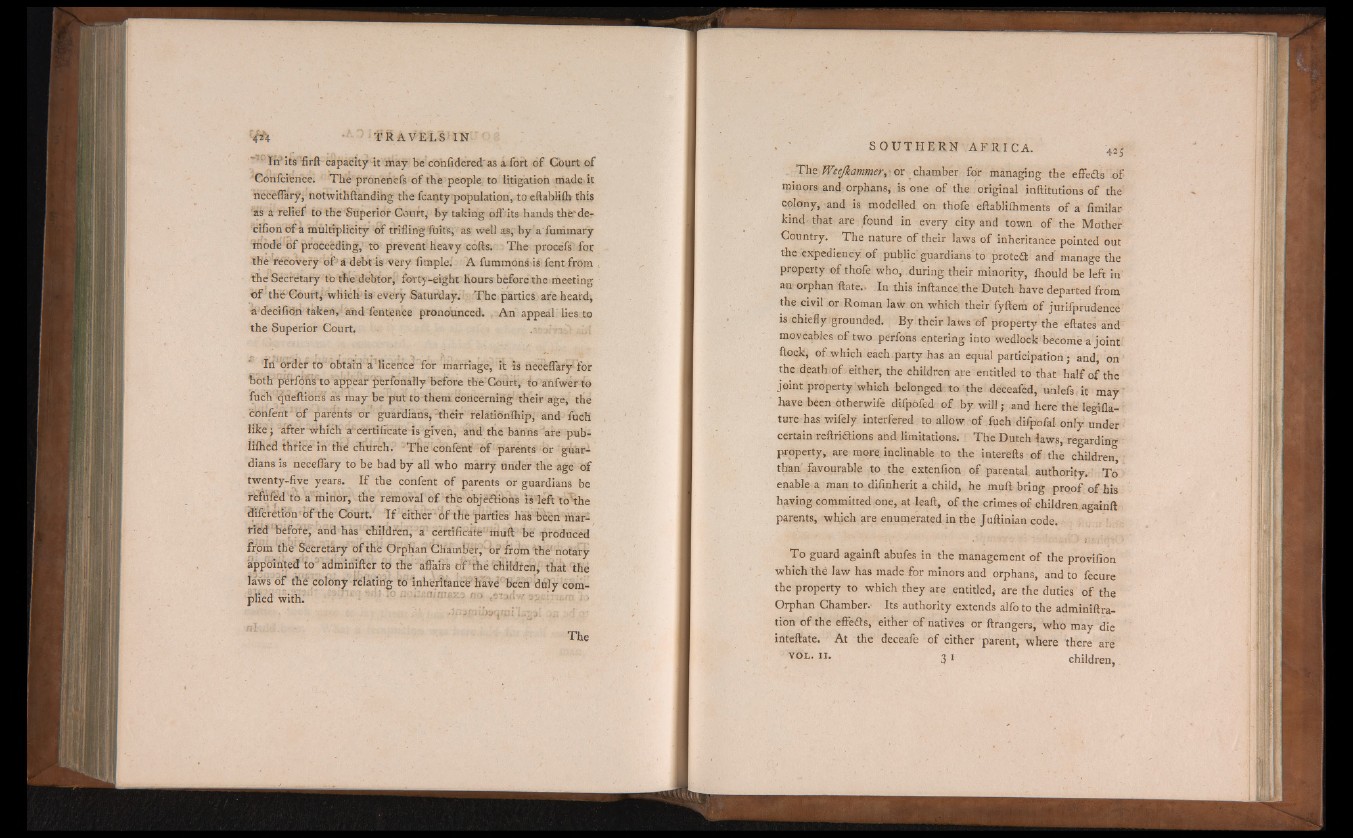
Irr1 its firft capacity it may be co’nfidered'as a fort of Court of
'Cônfcience. The pronenefs of the people to litigation made it
neceffary, notwithftanding the fcanty population, to eftabliih this
as a relief to the Superior Court, by taking off'its hands the'de-
cifionofà multiplicity of trifling foits,' as well as, by a fummary
triode of proceeding, to prevent heavy cofts. The- procefs for
thè recovery o f a debt is very fimple. A fummonsis fent from
the Secretary tb the debtor, forty-eight hours before the meeting
o f the Court,1 whielt is every Saturday. The parties are beard,
a decifion taken, and fentence pronounced. , An appeal lies to
the Superior Court. .• ; '
In'ordèr to obtain a licence for marriage, it is neceflary for
both p‘èffó&to appear pferfonatly before the Court, to anfwerto
fuch queftions’ as may be put to them concerning their age, the
confent of parents or guardians, -their relationihip, and fuch
like j after vrhich ai-certiffcate is given, and the banns are pub-
liihed thrice in thé church. The confent of parents Or guardians
is neceifary to be had by all who marry under the age of
twenty-five years. If the confent of parents or guardians be
refüfëd to a minor, the removal of the objéélkms Té left to'the
difcrêtibn'èfthe Court. If either of the parties has been married
befote, and has children, a certificate riiuft be produced
from the Secretary of the Orphan Ch'amHejvfor frefmthe' notary
appointed to" adminifier to the affairs of !the children, that the
laws of the colony relating to inherftanee have been duly complied
with.
The Weejkammer, or chamber for managing the effeits o f
minors and orphans, is one of the original inftitutions of the
colony, and is modelled on thofe eftabliihments of a fimilar
kind that are found in every city and town of the Mother
Country. The nature of their laws of inheritance pointed out
the expediency of public guardians to protect and manage the
property of thofe who, during their minority, ihould be left in
an orphan ftate.. In this inftance. the Dutch have departed from
the civil or Roman law on which their fyftem of jurifprudence
is chiefly grounded. By.their laws of property the eftates and
moveables of two perfons entering into wedlock become a joint
ftock, of which each.party has an equal participation; and, on
the death of either, the children are entitled to that half of the
joint property which belonged to the deceafed, unlefs it may
have been otherwife difpòfed of by will ; and here the legifla-
ture has wifely interfered to allow of fuch diipofal only under
certain reftriaions and limitations. The Dutch laws, regarding
property, are more inclinable to the interefts of the children
than favourable to the extenfion of parental authority. To
enable a man to difinherit a child, he mull bring proof of his
having committed one, at leaft, of the crimes of children againft
parents, which are enumerated in the Juftinian code.
To guard againft abufes in the management o f the provifion
which thè law has made for minors and orphans, and to fecure
the property to which they are entitled, are the duties o f the
Orphan Chamber. Its authority extends alfo to the adminiftra-
tion of the effefls, either of natives or ftrangers, who may die
inteftate. At the deceafe of either parent, where there are
^Oh.n. 3 1 children,